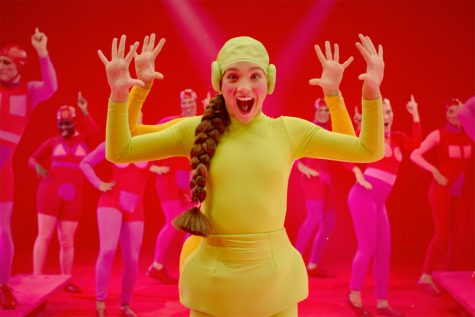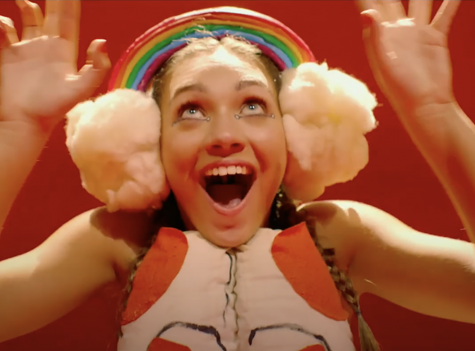Hollywood’s Growing Problem with Ableism: Sia’s MUSIC Film Controversy
March 5, 2021
It’s become a common theme all across Hollywood: Filmmakers and TV producers making questionable casting choices by handing out roles meant for POC to white people, LGBTQ characters to CIS actors/actresses, and disabled parts to able people. As we have begun to progress as a society and look upon our own mistakes, 2020/2021 has shown how a greater sense of awareness towards what is and is not offensive has grown. However, with acknowledgment comes action, and in TV and film this year, this prospect yielded mixed results because although some behavior was corrected, there is still hour’s worth of visual entertainment that encompasses blatant and offensive acting and casting prejudice. It’s been hitting headlines frequently with the star of Netflix’s Big Mouth, Jenny Slate, deciding to leave the series after acknowledging that as a white actor, it was wrong of her to continue voicing an African American character when there are plenty of black vocalists who could fill the role. More recently, the spotlight was laid upon James Corden who was criticized for his over-the-top and stereotypical portrayal of a gay character in the play-turned-movie The Prom, despite Corden not identifying with the community at all. This, however, is not new in any sense, as people are still discussing how wrong it was of the 2009 hit series “Glee!” to cast abled body actor, Kevin McHale, in the role of a wheelchair-bound teen, Artie, for the series’ 6-season run time.
Though directors, producers, and casting agents are working to end these stereotypes, these problems still exist and deserve to be acknowledged. The film drawing the most criticism recently is Australian singer Sia’s new movie, MUSIC. Due to its offensive nature towards the autism community, I chose not to support the film by streaming it. However, the general premise of the story was said to follow a woman named Zu who is newly sober when she receives news that she is to become the sole guardian of her half-sister named Music, a young girl with Autism Spectrum Disorder. If you’ve been keeping up with the headlines, you know that the film came under fire for many reasons, including the fact that the lead actress, Maddie Ziegler, depicted an autistic character despite being completely able-bodied/neurotypical, and for her stereotypical portrayal of what it is like to live with autism. This is simply not a film that can be brushed off and if anything needs to be discussed so that general audiences understand how ableism towards the disabled community has evolved, and why it is wrong to profit off an entertainment source that misconstrued the public’s idea of what autism actually is.
Whether we realize it or not, misconceptions can be detrimental and especially harmful towards the community they are directed towards. When we put out false information and narratives through stereotypical depictions through movies, we are leaving a lasting impact in the minds of the viewing audience who will now be led to believe, as Sia’s film characterizes, that all people with autism are completely detached from the real world. Autism has a spectrum, and with that being said, every individual with this disorder may experience things differently, so to have a neurotypical director and actress try to follow a stereotypical mold can be both misinforming and offensive.
 There are many controversial things about this film, so let’s start by discussing casting and “creative choices” that were quite problematic. Former Dance Moms star, Maddie Ziegler, has had a close relationship with the director, Sia, dating back to 2013 when she starred as the lead in her hit music video, Chandelier. Although her work in that video may have been harmless, this did not extend to MUSIC, where Ziegler accepted the role of a young girl with Autism Spectrum Disorder, despite the fact that she is able-bodied and neurotypical. Not only does the disabled community agree that the role should have been filled by an actual actress with autism, but that Ziegler’s portrayal was quite offensive. In the film, Sia envisioned the world of her character, Music, to clearly be one of a “fantasy world” because of her autism. This led to Ziegler using many exaggerated mannerisms and behaviors that are stereotypes associated with people with autism essentially making her “performance” a mockery of neurodiverse people. Further, those who actually watched the film pointed out how the character Music had no sense of personality at all aside from some interpretive song-and-dance numbers that were performed in a very stereotyped manner. If that wasn’t bad enough, the film was also accused of putting white actress, Maddie Ziegler, in black face. It was said that in one part of the film, Ziegler performs to Sia’s song, Body, in which she is wearing cornrows and appears to have her skin deliberately darkened with makeup. Between the racist “creative directions” and the caricature of autistic body language that is inherently unsettling and insincere proves that the original intent of the film was to never spotlight the neurodiverse community.
There are many controversial things about this film, so let’s start by discussing casting and “creative choices” that were quite problematic. Former Dance Moms star, Maddie Ziegler, has had a close relationship with the director, Sia, dating back to 2013 when she starred as the lead in her hit music video, Chandelier. Although her work in that video may have been harmless, this did not extend to MUSIC, where Ziegler accepted the role of a young girl with Autism Spectrum Disorder, despite the fact that she is able-bodied and neurotypical. Not only does the disabled community agree that the role should have been filled by an actual actress with autism, but that Ziegler’s portrayal was quite offensive. In the film, Sia envisioned the world of her character, Music, to clearly be one of a “fantasy world” because of her autism. This led to Ziegler using many exaggerated mannerisms and behaviors that are stereotypes associated with people with autism essentially making her “performance” a mockery of neurodiverse people. Further, those who actually watched the film pointed out how the character Music had no sense of personality at all aside from some interpretive song-and-dance numbers that were performed in a very stereotyped manner. If that wasn’t bad enough, the film was also accused of putting white actress, Maddie Ziegler, in black face. It was said that in one part of the film, Ziegler performs to Sia’s song, Body, in which she is wearing cornrows and appears to have her skin deliberately darkened with makeup. Between the racist “creative directions” and the caricature of autistic body language that is inherently unsettling and insincere proves that the original intent of the film was to never spotlight the neurodiverse community.
The second part of this film’s controversy stems from Sia’s defense of the film, and the more disturbing scenes that involve restraint and strobes that make the film inherently unwatchable to those who actually have autism. For years, the autism community has been fighting against the use of physical restraints that traumatize and even kill those with the disorder for acting out behaviors they have no control over. However, clearly uneducated on this, Sia decided to include a scene where Music was restrained whilst having a public meltdown which only further perpetuated the idea that this form of control is OK to use on the mentally disabled when they act out. “Had the filmmakers chosen to meaningfully involve autistic people from the beginning, we could have told them how catastrophically irresponsible it is to encourage viewers to use the kind of deadly restraints that killed Max Benson, Eric Parsa, and many other members of our community” is what director of the Autistic Self Advocacy Zoe Gross had to say about these scenes. Many other members of the autistic community have also voiced their concerns over the film on platforms like Twitter and TikTok calling these scenes a “blatant mockery” and “hard to watch.” This relates to how damaging misconception can be, especially as experts argue that restraint against those with autism is super dangerous because (depending on where they fall on the spectrum) some may not be able to communicate that they can not breathe. Sia also included an intro that opens with the flashing of strobe lights that can be quite triggering to some on the spectrum, which essentially excludes some neurodiverse members from the viewing audience, despite the film’s intention to be a “tribute” to their disability. 
In response to the controversy, Sia claims that she had good intentions with the film though it may have come off as a mockery, ultimately stood behind her choices. She claimed she cast Ziegler because she tried working with an actual teenage girl with autism and found the experience to be too “difficult” and “stressful.” Despite justified claims of racism and ableism, Sia continued to stand by her movie and claimed she wanted to make it after her long infatuation and interest with the autism community. That statement drew even more backlash as many accused the singer of treating those with autism like they were some “rare creatures.” Many also had a problem with the fact that Sia chose to work with Autism Speaks for this film. The organization has been criticized for its inability to actually serve the needs of autistic people and their families and instead portrays them as being helpless in a sense.
Advisors of many autism support programs and the neurodiverse community themselves agree that more representation of neurological disorders in film and TV should increase as a way to end stereotypes and stigma around the community. I too would agree that it is very important for all different groups of people to be accurately represented in different forms of entertainment in a way that does not focus on solely their adversity, but what it is generally like to live a little bit differently. I certainly have no place to say what is/is not offensive about the film MUSIC because I am not part of the neurodiverse community myself, however, I feel that what Sia produced was clearly inherently racist/ableist and all those involved- Sia, Kate Hudson, Maddie Ziegler, etc. should be held accountable for their mockery of the autism community. It was honestly quite disgusting to hear that a movie that displayed such blatant misinterpretations was nominated for a Golden Globe, which only further highlights how normalized ableism is in Hollywood. This film quite literally was a horrid tone-deaf interpretation of what autism truly is, and did nothing but spread misconceptions about neurodiversity and restraint. People who are neurodiverse or have autism do not all fit one mold, nor should they be treated like reality- detached human beings which is why it is critical that we start tackling the problems with ableism at its source by educating ourselves against the misconceptions spewed by the media in film like this.
***This opinion article reflects the voice of the writer and does not necessarily represent the views of The Viking Times as a whole. Like most news outlets, The Viking Times is a non-partisan media platform.***



